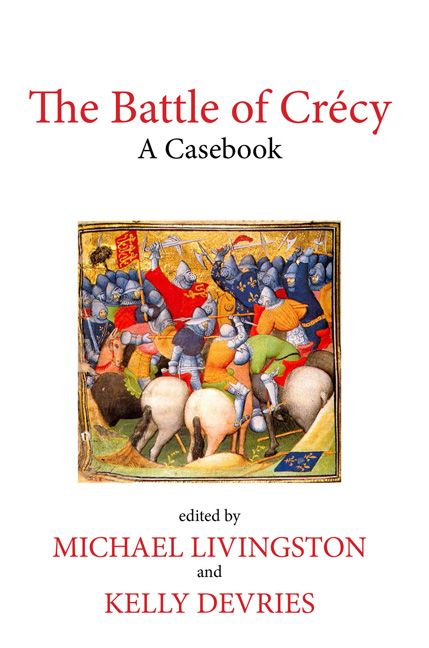Book contents
- Frontmatter
- Contents
- ILLUSTRATIONS
- CONTRIBUTORS
- PREFACE: THE SHAPE OF THE VOLUME
- MAP OF THE CRÉCY CAMPAIGN
- LOSSES UNCOUNTABLE: THE CONTEXT OF CRÉCY
- SOURCES ON THE BATTLE
- NOTES TO THE TEXTS
- ESSAYS ON THE BATTLE
- THE LOCATION OF THE BATTLE OF CRÉCY
- THE BOHEMIAN PARTICIPATION IN CRÉCY
- THE GENOESE CROSSBOWMEN AT CRÉCY
- THE TACTICS OF CRÉCY
- FROISSART'S HERCE AND CRÉCY
- THE ITALIAN PERSPECTIVE ON CRÉCY
- COUNTING THE DEAD AT CRÉCY
- THE AFTER-LIFE OF CRÉCY
- BIBLIOGRAPHY
- INDEX TO THE VOLUME
THE GENOESE CROSSBOWMEN AT CRÉCY
- Frontmatter
- Contents
- ILLUSTRATIONS
- CONTRIBUTORS
- PREFACE: THE SHAPE OF THE VOLUME
- MAP OF THE CRÉCY CAMPAIGN
- LOSSES UNCOUNTABLE: THE CONTEXT OF CRÉCY
- SOURCES ON THE BATTLE
- NOTES TO THE TEXTS
- ESSAYS ON THE BATTLE
- THE LOCATION OF THE BATTLE OF CRÉCY
- THE BOHEMIAN PARTICIPATION IN CRÉCY
- THE GENOESE CROSSBOWMEN AT CRÉCY
- THE TACTICS OF CRÉCY
- FROISSART'S HERCE AND CRÉCY
- THE ITALIAN PERSPECTIVE ON CRÉCY
- COUNTING THE DEAD AT CRÉCY
- THE AFTER-LIFE OF CRÉCY
- BIBLIOGRAPHY
- INDEX TO THE VOLUME
Summary
Certainly one of the Battle of Crécy's defining features is the role of the Genoese crossbowmen in the fight. Understanding the utilization of this mercenary force is a central component to understanding the engagement itself, beginning with their initial appearance as the vanguard of the French army, then to their quick defeat by English longbows, that forced an abrupt retreat into allied cavalry, ultimately leading to the defeat of the French army (on which event, see DeVries’ subsequent essay on the tactics of the battle). Even in the subsequent history of the battle the Genoese have held a central role. That their actions at Crécy are judged treasonous by some contemporary writers and modern historians assigns to the Genoese a blame that somewhat exonerates the “French” army and Philippe VI — although even the most ardent proponent of such blame would have to admit that the decision to send the Genoese into battle technologically unprepared, and then to order the cavalry to follow them, was clearly the king's. Still other commentators have judged that, while not traitors, the Genoese were certainly cowards, more quick to retreat than the situation warranted, and that such a hasty withdrawal could not have been anticipated by the main French attack: the lines of cavalry coming into position in order to assault the point where the crossbow shot should have caused confusion among the English; the result was a confusion not among the English, but among the French. No commentator, contemporary or modern, limits the Genoese influence in the ensuing defeat.
But that, generally, has been the extent of discussion. Other than the names of their leaders, Carlo Grimaldi and Aitone Doria (the latter's name often spelled Ottone or Antonio), and the fact that these men were mercenaries — which is to say “foreign” and “paid” — who shot crossbows, little more is written about who the Genoese at Crécy were. Not knowing their story is, no doubt, one of the reasons for some of the accusations leveled against them.
The Grimaldi and Doria families had been among the leaders of Genoa for several centuries.
- Type
- Chapter
- Information
- The Battle of CrécyA Casebook, pp. 441 - 446Publisher: Liverpool University PressPrint publication year: 2015



